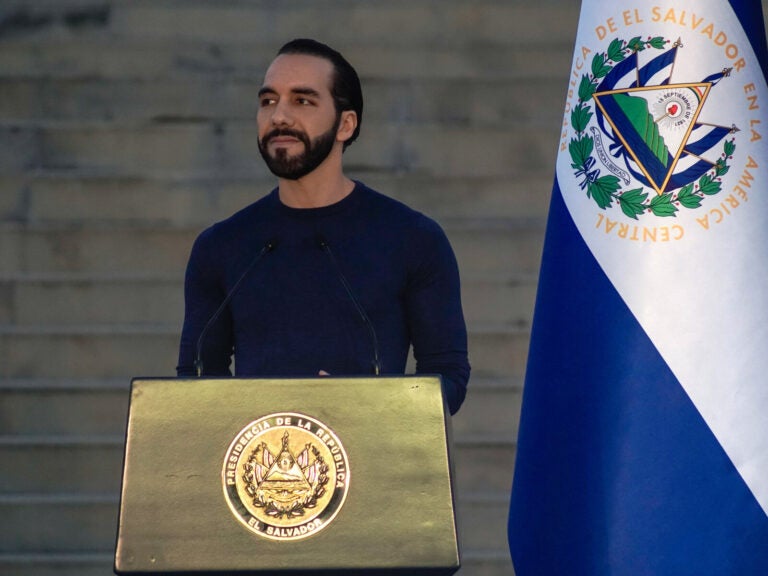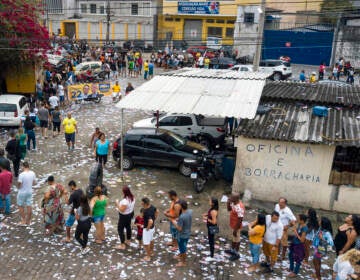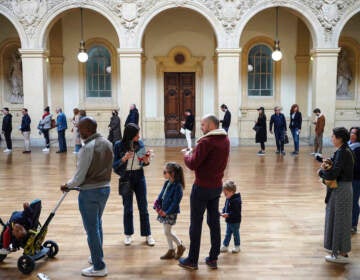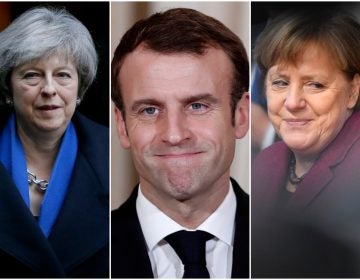El Salvador is poised to reelect its popular but authoritarian president

LA LIBERTAD, EL SALVADOR - NOVEMBER 20: President of El Salvador Nayib Bukele speaks during the inauguration of a new Vijosa Laboratories plant on November 20, 2023 in La Libertad, El Salvador. (Photo by Alex Peña/Getty Images)
Salvadorans are voting this Sunday in elections for president, vice president and all 60 seats in the country’s unicameral legislature.
Nayib Bukele, the president since 2019, is widely expected to be reelected in a landslide despite a constitutional ban on presidents serving consecutive terms. His party, Nuevas Ideas, is also expected to take on a larger majority in the Legislative Assembly.
Bukele, 42, is incredibly popular in El Salvador. He’s perhaps best known for his brutal crackdown on the country’s violent and powerful gangs that had dominated public life.
The country is much safer now than just a few years ago; the murder rate has dropped steeply from a 2015 high, according to the Salvadoran government. But it has come at the cost of civil rights — tens of thousands of people have been arrested on accusations of being affiliated with gangs. The incarceration rate is now the highest in the world. And Bukele has worked to consolidate power and eliminate political opposition.
Here’s what to know about El Salvador’s elections and what could come next.
Bukele will win reelection easily, polls predict
Across El Salvador, Bukele is widely popular for his crackdown on the country’s gangs. He has also worked to popularize himself with an extensive government-backed media apparatus.
Recent polls showed Bukele being the only presidential candidate with any real shot at winning. Multiple polls released in January showed him with at least 70% support, compared with his opponents registering in the low single digits.
The parties that had previously dominated El Salvador’s politics for decades, the right-wing ARENA and the left-wing FMLN, have been relegated to a small number of seats in the Legislative Assembly.
For years, Bukele has made moves to tighten his grip on power.
Bukele’s legislative allies removed and replaced members of the Supreme Court, stacking the court with loyalists. That move made it possible for Bukele to run for an immediate second term, even though El Salvador’s Constitution forbids it, because the court reinterpreted that section of the Constitution in 2021.
In 2023, in what opponents said was another effort to consolidate power, Bukele and Nuevas Ideas pushed through a law to downsize the legislature from 84 seats to 60. Nuevas Ideas could go from a two-thirds majority to occupying nearly every seat.
Bukele’s administration also launched a system for Salvadorans living abroad to vote electronically, which is expected to boost him further.
“We’re moving towards a one-party state with only the semblance of democratic legitimacy,” says Jorge Cuéllar, a professor of Latin American, Latino and Caribbean studies at Dartmouth who has written about El Salvador. “And I think that’s basically already happened.”
Bukele’s gang crackdown has reduced violence, at a cost
Gang violence has been a large presence in Salvadoran life for at least two decades, with the warring MS-13 and 18th Street gangs responsible for much of it.
Initially, Bukele’s administration allegedly tried to make a truce with the gangs. In 2020, according to the U.S. Treasury Department, officials provided financial incentives and other privileges in exchange for the gangs’ political support and lower rates of gang violence. (Bukele has denied this.)
But after a particularly violent weekend in March 2022, Bukele announced a state of emergency.
Since then, security forces have arrested at least 76,000 people suspected of being in gangs as part of the government’s emergency powers. A new megaprison was built to house many of them.
The homicide rate has since gone from 106.8 per 100,000 in 2015 to 7.8 per 100,000 in 2022, according to a study from the United Nations Office on Drugs and Crime.
In some neighborhoods, residents are now free to travel through formerly gang-run areas without fear of violence or extortion.
NPR’s Eyder Peralta visited one former gang stronghold last year to find it eerily quiet. “The gangs terrorize communities. They harass citizens. They turn neighborhoods into war zones,” he said. “So on these streets, you hear little sympathy. Let them rot in jail. Kill them, people told me.”
“People have a sense of security now and safety that they hadn’t felt in quite a long time. So we can’t discount that,” says Cuéllar.
But thousands of people with no gang connection have also been swept up in the arrests, human rights advocates say.
Verónica Reyna, who researches human rights for the Salvadoran group Passionist Social Services, says prisons are overcrowded and prisoners face unsanitary conditions, limits on food and water, and other mistreatment. An aid group recorded at least 223 deaths in prisons so far during the state of emergency, “some of these with clear signs of having suffered torture,” she told NPR in an email.
Reyna says journalists, trade unionists and informal vendors have also been intimidated by the police and threatened with arrest.
“In some way,” she adds, the state of emergency “is a permanent threat to anyone who may be inconvenient to the president’s interests, and could be applied to anyone at any time.”
What’s next and why foreigners should pay attention
Cuéllar draws parallels between the popularity of Bukele and other strongmen in Latin America who have built themselves up as national saviors.
“It should be a kind of signal to U.S. audiences that this is also happening in other countries nearby,” Cuéllar says, where voters are being attracted to Bukele-like figures “to solve problems.”
He points to the recent presidency of far-right Jair Bolsonaro in Brazil, whose supporters stormed Brazil’s Congress last year after his electoral defeat. In Argentina, radical right-wing libertarian Javier Milei was elected president in December and has called for lawmakers to grant him additional powers.
Reyna thinks an apt comparison for what the future holds for Bukele is in nearby Nicaragua, where President Daniel Ortega has been in power since 2007.
“Bukele not only hopes to win the next elections, he will seek re-election indefinitely, either himself or through his family,” she writes.
“Nicaragua is a good example of what happens when presidents accused of corruption and human rights violations remain in power: democracy is dismantled, they become dictatorships and perpetuate impunity,” she continues. “The population that has suffered the most from gang violence is the one that suffers the most from arbitrary arrests, torture and threats from the police. It will be this population that will continue to be the most affected.”




